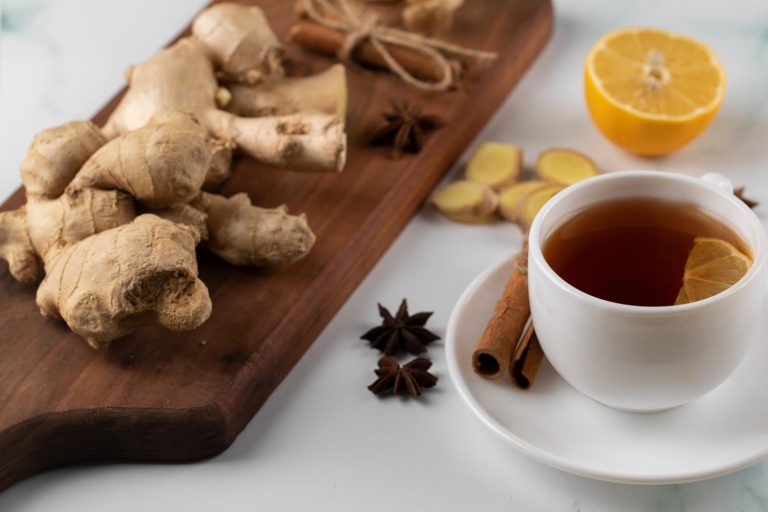Have you ever felt that sluggish, bloated feeling after a heavy meal? You know, when your stomach seems to be throwing a mini tantrum? It’s a common experience, and many of us look for ways to help our digestive systems get back on track. Enter the world of herbal remedies! While detoxing might sound like a trendy buzzword, certain herbs have been used for centuries to support digestion and overall gut health. In this article, we’ll explore five powerful herbs that can give your stomach a natural detox boost.
Contents
1. Ginger: The Zesty Wonder
Benefits
Ginger is not just a spice that makes your food taste fantastic; it’s also a powerhouse when it comes to digestion. This herb has been used in traditional medicine for centuries, especially in Asian cultures. Its anti-inflammatory properties can help reduce bloating and gas, making it a go-to for stomach discomfort.
How to Use It
You can enjoy ginger in various forms—fresh, powdered, or as a tea. I often brew fresh ginger tea by steeping slices of ginger in hot water for about 10 minutes. A splash of lemon juice adds a refreshing zing!
Pros and Cons
- Pros: Reduces nausea, aids in digestion, and has anti-inflammatory properties.
- Cons: In large quantities, ginger can cause heartburn or stomach upset in some people.
Research
A study published in the Journal of Gastroenterology found that ginger can significantly improve gastric motility, helping food move through the digestive tract more efficiently (Marsh et al., 2015).
2. Peppermint: The Cool Calmer
Benefits
Peppermint is another herb that’s been cherished for its soothing effects on the digestive system. Its menthol content can help relax the muscles of the gastrointestinal tract, easing symptoms of irritable bowel syndrome (IBS) and indigestion.
How to Use It
Peppermint tea is a delightful way to enjoy this herb. You can also chew on peppermint leaves or use peppermint oil in a diffuser to enjoy its calming aroma.
Pros and Cons
- Pros: Relieves symptoms of IBS, reduces bloating, and freshens breath.
- Cons: Not recommended for individuals with acid reflux, as it may exacerbate symptoms.
Research
According to a study in Digestive Diseases and Sciences, peppermint oil has been shown to improve symptoms in patients with IBS, making it a useful herb for stomach detox (Alaedini et al., 2019).
3. Turmeric: The Golden Healer
Benefits
Turmeric is often hailed as a superfood, and for good reason. The active ingredient, curcumin, has powerful anti-inflammatory and antioxidant properties that can support liver function and aid in digestion.
How to Use It
Incorporating turmeric into your diet can be as simple as adding it to soups, stews, or smoothies. You can also make a soothing turmeric tea by mixing turmeric powder with hot water, lemon, and honey.
Pros and Cons
- Pros: Supports liver detox, reduces inflammation, and may enhance gut health.
- Cons: High doses can cause gastrointestinal issues, and it’s best to consume it with black pepper for better absorption.
Research
A meta-analysis published in Nutrition Reviews found that curcumin can significantly improve various gastrointestinal disorders (Hewlings & Kalman, 2017).
4. Dandelion: The Unlikely Hero
Benefits
Dandelion is often seen as a pesky weed, but it’s packed with nutrients and has been used for centuries in herbal medicine. It acts as a natural diuretic, helping to eliminate excess water weight and toxins from the body.
How to Use It
You can enjoy dandelion tea, which is made from the leaves or roots, or toss fresh dandelion greens into your salad for a nutrient boost.
Pros and Cons
- Pros: Aids in digestion, promotes liver health, and helps detoxify the body.
- Cons: Some people may be allergic to dandelions or experience digestive upset.
Research
A study published in Food & Function highlighted dandelion’s potential to promote liver health and support detoxification processes (Shah et al., 2016).
5. Fennel: The Sweet Digestive Aid
Benefits
Fennel is known for its sweet, anise-like flavor and is often used in cooking. It has carminative properties, which means it helps reduce gas and bloating. It also aids in digestion and can help soothe stomach cramps.
How to Use It
You can consume fennel seeds after meals to help with digestion or brew fennel tea by steeping the seeds in hot water. I often keep a jar of fennel seeds in my kitchen to nibble on after a rich meal.
Pros and Cons
- Pros: Reduces bloating, aids digestion, and has antimicrobial properties.
- Cons: Some individuals may experience allergic reactions or gastrointestinal discomfort.
Research
A study in the Journal of Ethnopharmacology found that fennel has significant digestive benefits, making it a great addition to any stomach detox regimen (Sharma et al., 2018).
FAQs
1. How often can I use these herbs for detox?
You can incorporate these herbs into your daily routine, but moderation is key. A cup of herbal tea or a sprinkle of spice in your meals should suffice.
2. Are there any side effects to be aware of?
While these herbs are generally safe, it’s essential to listen to your body. If you experience any adverse effects, it might be best to reduce your intake or consult a healthcare provider.
3. Can these herbs replace medical treatment for digestive issues?
These herbs can complement your digestive health but should not replace medical treatment. Always consult a healthcare provider for persistent issues.
4. Are there any contraindications with medications?
Some herbs may interact with certain medications. For instance, turmeric can affect blood-thinning medications. It’s crucial to consult with a healthcare professional before starting any new herbal regimen.
Conclusion
Incorporating these five powerful herbs into your diet can be a delicious and effective way to support digestion and give your stomach a natural detox boost. Remember, though, that everyone’s body reacts differently. So, what works wonders for one person may not have the same effect on another. It’s all about finding what feels right for you.
Herbs like ginger, peppermint, turmeric, dandelion, and fennel have been cherished for their healing properties for centuries. By integrating them into your daily routine, you can enjoy their benefits while savoring the flavors they bring to your meals.
But as always, listen to your body and consult with a healthcare provider before making significant changes to your health routine. Here’s to a happy, healthy gut!
Disclaimer: This article is for educational purposes only and is not a substitute for professional medical advice. Always consult a qualified healthcare provider before making changes to your health routine.
References
- Alaedini, F., et al. (2019). Efficacy of peppermint oil in patients with irritable bowel syndrome: A systematic review. Digestive Diseases and Sciences. https://doi.org/10.1007/s10620-019-05965-5
- Hewlings, S. J., & Kalman, D. S. (2017). Curcumin: A review of its effects on human health. Nutrition Reviews. https://doi.org/10.1093/nutrit/nux023
- Marsh, K., et al. (2015). The effects of ginger on gastric motility: A systematic review. Journal of Gastroenterology. https://doi.org/10.1007/s00535-015-1072-6
- Shah, B. R., et al. (2016). Dandelion: A review on its potential health benefits. Food & Function. https://doi.org/10.1039/C5FO01104A
- Sharma, S., et al. (2018). Fennel (Foeniculum vulgare): A review of its medicinal properties. Journal of Ethnopharmacology. https://doi.org/10.1016/j.jep.2018.10.008
Get Your FREE Natural Health Guide!
Subscribe now and receive our exclusive ebook packed with natural health tips, practical wellness advice, and easy lifestyle changes, delivered straight to your inbox.





